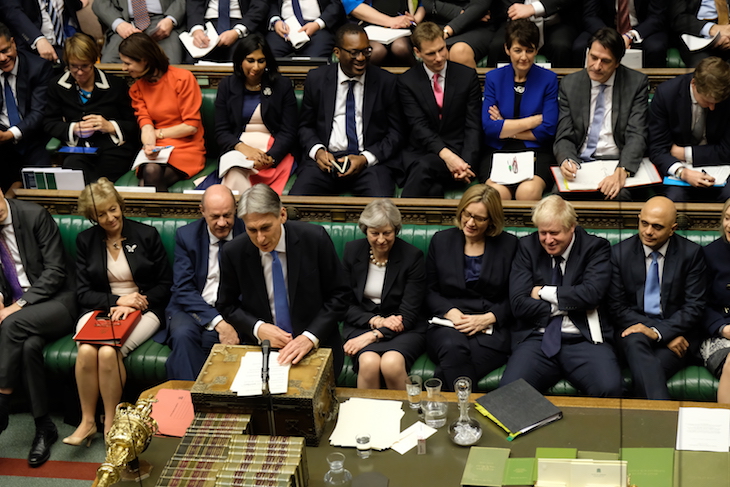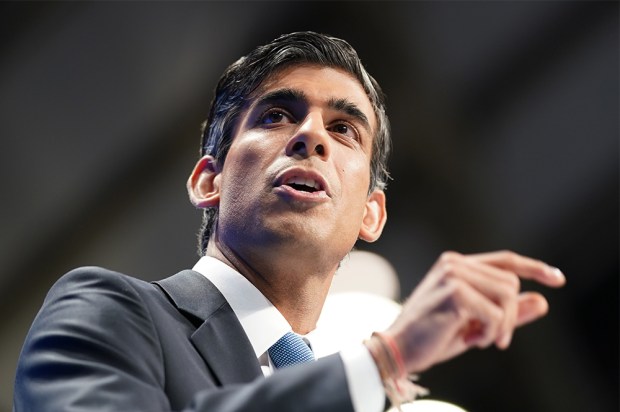Philip Hammond began his first Budget, in March, by playing down its importance — for his big ideas on fiscal policy, he suggested we would have to wait until the autumn. It was a wait which was very nearly extended to eternity as he narrowly avoided losing his job in a post–election reshuffle. We found out this week that it was a bluff: he doesn’t have many big ideas, just a selection of small ones. Which, under the circumstances, is something of a relief.
The Chancellor is getting better at telling Britain’s story, boasting about record employment and how the best-paid 1 per cent pay 27 per cent of all income tax. He didn’t say why (that tax rates for the best-paid were reduced), nor did he double down on more tax cuts that could have stimulated growth. The gloomy growth forecasts underline the case for radical pro-growth Conservative policies, but we settled for some small ones. There was tax relief for entrepreneurs, business rates indexed to the lower CPI index ahead of schedule. All welcome.
The centrepiece of his budget was a target to build 300,000 new homes a year by the mid-2020s. But this is hard to take seriously without a thorough rethink of the planning system and building regulations (which he promised to ‘focus on’), and in any case, housing is a hostage to economic conditions. Ten years ago, Gordon Brown in his last Budget similarly set himself a house–building target — albeit of only 200,000 homes a year between then and 2020 — only to see the credit crunch and subsequent banking collapse render it a pipe dream.
We heard a lot about driverless cars on British roads — but that is in the hands of the technologists, not Philip Hammond. There are many problems to be solved before such vehicles can safely be allowed on the roads, and Hammond has no idea how, or at what pace, they can be solved. In latching himself to an exciting-sounding technology he is taking a leaf out of the rulebook of Harold Wilson, who liked to talk of the ‘white heat of technology’ as a means of distinguishing himself from Conservatives who gave the impression that they belonged on the grouse moors.
The reforms to Universal Credit were welcome, especially cutting the wait for new claimants. The Tories often seem to fall into a trap of thinking that young people are all mobile graduates on the lookout for cheaper train fares to London. In fact, a great many are low-paid workers who need Universal Credit to work as it was intended — encouraging people to leave welfare and take up employment. There is still much repair work to do, given how much the in-work allowance was cut back under George Osborne.
In this Budget there was an opportunity to take the fight to Jeremy Corbyn by laying down clear battle lines over taxation and spending, to present the young voters who deserted the Conservatives in June with a clear choice: do you want the government to spend your money on your behalf — or would you like to keep more of it yourself, so that you can make your own spending decisions?
That battle of ideas will have to come at some point, but it has become clear that the Conservatives do not yet have the stomach for it.
Hope in Zimbabwe
With Robert Mugabe’s departure goes one of the caricatures of late 20th-century Africa: the tinpot dictator who brutalises his opponents, impoverishes his people yet manages to extract enough wealth from a decaying economy for a fleet of Rolls-Royces and a private jet to speed him off to private medical appointments in Singapore. But his long-overdue resignation should not be allowed to detract from what is going on elsewhere in sub-Saharan Africa.
Zimbabwe, which did not stand out for its rottenness in the early years of Mugabe’s rule, now finds itself surrounded by either functioning democracies or fairly benign regimes with some element of democracy. Aside from Zimbabwe, African economies have grown consistently this century, averaging 5.4 per cent between 2000 and 2010 and by 3.3 per cent since the economic crash. Foreign investment mushroomed from $14 billion in 2004 to $73 billion a decade later, before falling back with the collapse in commodity prices. ‘Africa’ and ‘hunger’ no longer roll off the tongue together. The proportion of Africans with access to safe water has grown from 51 per cent in 1990 to 77 per cent in 2015.
If there is a model for Zimbabwe now, it is neighbouring Botswana. Much poorer than Zimbabwe when Mugabe took power in 1980, it has pulled itself up to be an upper-middle-income country. It has a multi-party democracy and a government which actively seeks overseas investment. It stands as an example of what a developing country can achieve when it seeks to do business rather than, like Mugabe, failing to move on from anti-colonial struggle.
Got something to add? Join the discussion and comment below.
Get 10 issues for just $10
Subscribe to The Spectator Australia today for the next 10 magazine issues, plus full online access, for just $10.
You might disagree with half of it, but you’ll enjoy reading all of it. Try your first month for free, then just $2 a week for the remainder of your first year.














Comments
Don't miss out
Join the conversation with other Spectator Australia readers. Subscribe to leave a comment.
SUBSCRIBEAlready a subscriber? Log in